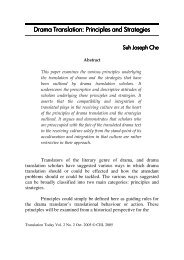Re-Evaluation of Lin Shu (the Chinese Translator) - National ...
Re-Evaluation of Lin Shu (the Chinese Translator) - National ...
Re-Evaluation of Lin Shu (the Chinese Translator) - National ...
You also want an ePaper? Increase the reach of your titles
YUMPU automatically turns print PDFs into web optimized ePapers that Google loves.
152 <strong>Re</strong>-<strong>Evaluation</strong> <strong>of</strong> <strong>Lin</strong> <strong>Shu</strong> (<strong>the</strong> <strong>Chinese</strong> <strong>Translator</strong>):A Systemic Approach to Literary Translationsystem is under <strong>the</strong> control <strong>of</strong> two mechanisms. One is from <strong>the</strong>inside <strong>of</strong> <strong>the</strong> literary system to keep order within <strong>the</strong> system. Here<strong>the</strong> determinant factor is poetics. The o<strong>the</strong>r is from <strong>the</strong> outside <strong>of</strong> <strong>the</strong>literary system to “secure <strong>the</strong> relations between literature and itsenvironment” (Hermans, 2004: 126). Here <strong>the</strong> key term is ideology.Lefevere defined ideology as “<strong>the</strong> conceptual grid that consists <strong>of</strong>opinions and attitudes deemed acceptable in a certain society at acertain time and through which readers and translators approachtexts” (ibid: 126-127). By patronage, Lefevere means “somethinglike <strong>the</strong> powers (persons, institutions) that can fur<strong>the</strong>r or hinder <strong>the</strong>reading, writing, and rewriting <strong>of</strong> literature” (Lefevere, 2004: 15).Ideology is <strong>the</strong> main concern <strong>of</strong> patronage (ibid.). Poetics is “<strong>the</strong>dominant concept <strong>of</strong> what literature should be, or can be allowed tobe, in a given society” (Hermans, 2004: 127). Lefevere claimed that“rewritings” including translations “are <strong>of</strong> crucial social andcultural relevance because <strong>the</strong>y determine <strong>the</strong> ‘image’ <strong>of</strong> a literarywork when direct access to that work is limited or nonexistent” and“all rewritings, <strong>the</strong>n, take place under <strong>the</strong> constraints <strong>of</strong> patronage,ideology and poetics” (ibid: 128). In sum, Lefevere thought <strong>of</strong>ideology, patronage and poetics as more important constraints ontranslation than linguistic differences.This article fur<strong>the</strong>r examines and elaborates how ideology,patronage, and poetics influence <strong>Lin</strong>’s translations respectively.Ideology and <strong>Lin</strong> <strong>Shu</strong>’s TranslationThere’s a certain relationship between ideology and translation,and ideology imposes great impact on translation. (Lefevere, 2004:41). This part seeks to expose how ideology influences <strong>Lin</strong> <strong>Shu</strong>’stranslation through <strong>the</strong> analysis <strong>of</strong> <strong>Lin</strong> <strong>Shu</strong>’s choice <strong>of</strong> text fortranslation and <strong>the</strong> translating method he adopted.
















